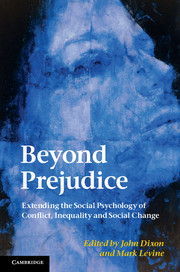Book contents
- Frontmatter
- Contents
- Figures
- Tables
- Contributors
- Acknowledgements
- Introduction
- Part I Beyond prejudice
- Part II Prejudice and social change revisited
- 11 Models of social change in social psychology: collective action or prejudice reduction? Conflict or harmony?
- 12 From attitudes to (in)action: the darker side of ‘we’
- 13 Contact and social change in an ongoing asymmetrical conflict: four social-psychological models of reconciliation-aimed planned encounters between Israeli Jews and Palestinians
- 14 From prejudice to collective action
- Conclusions and future directions
- Index
- References
13 - Contact and social change in an ongoing asymmetrical conflict: four social-psychological models of reconciliation-aimed planned encounters between Israeli Jews and Palestinians
from Part II - Prejudice and social change revisited
Published online by Cambridge University Press: 05 June 2012
- Frontmatter
- Contents
- Figures
- Tables
- Contributors
- Acknowledgements
- Introduction
- Part I Beyond prejudice
- Part II Prejudice and social change revisited
- 11 Models of social change in social psychology: collective action or prejudice reduction? Conflict or harmony?
- 12 From attitudes to (in)action: the darker side of ‘we’
- 13 Contact and social change in an ongoing asymmetrical conflict: four social-psychological models of reconciliation-aimed planned encounters between Israeli Jews and Palestinians
- 14 From prejudice to collective action
- Conclusions and future directions
- Index
- References
Summary
Introduction
This chapter focuses on reconciliation-aimed intergroup encounters – between Israeli Jews and Palestinians – that attempt to reduce hostility and increase understanding and cooperation between the two nationalities. Like other contact interventions conducted in settings of intergroup conflict, encounters between Israeli Jews and Palestinians represent a paradoxical project aiming to produce equality and cooperation between groups that are embedded in a protracted, asymmetrical conflict. Though existing research teaches us valuable lessons on the effectiveness of contact conducted under optimal conditions (Pettigrew, 1998; Pettigrew and Tropp, 2000, 2006), little is said about contact between groups involved in an acute dispute (Dixon and Durrheim, 2003; for important exceptions see Salomon, 2004, 2006).
The study presented here is inspired by a recent school of thought that looks at processes and effects of contact in non-optimal conditions of deeply divided societies (Dixon and Durrheim, 2003; Dixon et al., 2005, 2007; Hewstone, 1996). It also joins a growing number of studies presenting a critical approach to planned encounters between Israeli Jews and Palestinians (Abu-Nimer, 1999, 2004; Bekerman, 2002, 2009, in press; Halabi and Sonnenschein, 2004; Helman, 2002; Salomon, 2004; Suleiman, 2004).
- Type
- Chapter
- Information
- Beyond PrejudiceExtending the Social Psychology of Conflict, Inequality and Social Change, pp. 269 - 285Publisher: Cambridge University PressPrint publication year: 2012
References
- 9
- Cited by



